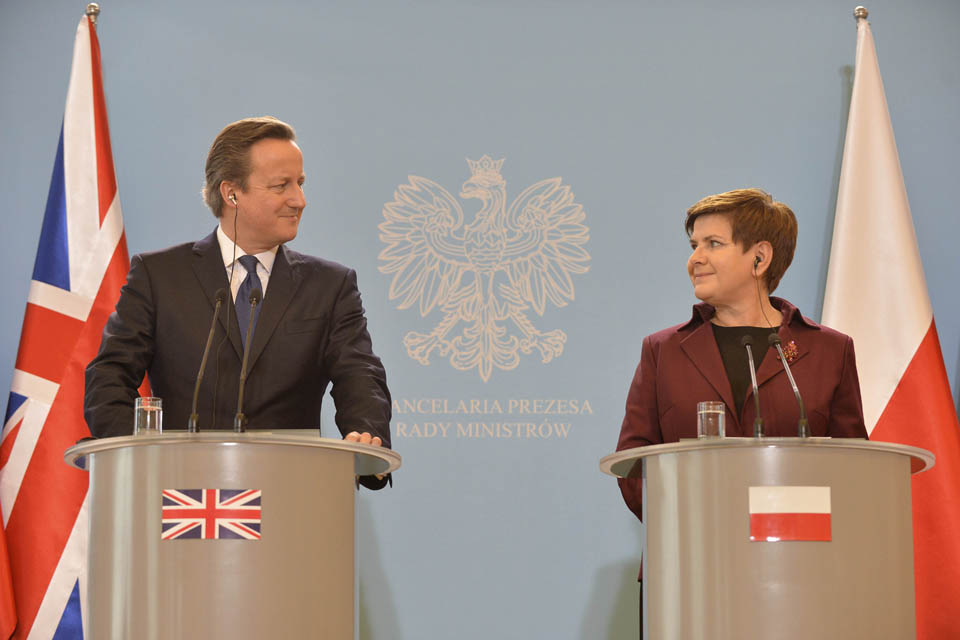PM statement in Poland: 10 December 2015
After a meeting with the Polish Prime Minister Szydło, David Cameron spoke in Warsaw on the UK-Poland relationship, defence and EU reform.

Thank you Prime Minister for welcoming me here to Warsaw.
It is an honour to be the first leader to make a bilateral visit to Poland since your inauguration.
The relationship between the United Kingdom and Poland matters – it matters for our prosperity and for our security.
It always has. It always will.
This year we commemorated the 75th anniversary of the Battle of Britain, and it was an honour to do so in St Paul’s Cathedral in London standing alongside President Duda.
People in Britain never forget how brave Polish pilots played such a critical role in standing up for freedom and in fighting fascism.
And we will never forget the role that Poland played in standing up to communism and restoring liberty to this continent.
The images of Solidarity, defying and defeating a repressive government and ultimately helping to tear down the iron curtain – these are the images of my childhood, images which have shaped my entire political outlook.
Today, in 2015, I believe we are natural partners.
Partners in trade – the UK is Poland’s second largest trading partner and British companies invested over 3 billion euros here last year.
Partners in defence – as fellow NATO members, we are steadfastly committed to the security of our allies.
And as partners in the EU – it is great to see a sister party in the European Conservatives and Reformists Group back in power.
Together we founded that group, now the third largest grouping in the European Parliament.
I look forward to building stronger links between our parties – in Brussels but also in Poland and in Britain too.
We have had very good discussions here, particularly about working together on defence and on EU reform.
Let me say a word on each.
Defence and security
We are both strong members of NATO.
We are both meeting the target of spending 2% of GDP on defence.
And Britain is committed to making the next NATO Summit, which will be held here in Warsaw next July, as much of a success as the Wales Summit was.
The United Kingdom is firmly committed to protecting the security of NATO’s eastern flank.
The Royal Air Force regularly participates in the Baltic Air Policing mission and we have deployed 3,000 troops on training exercises in Poland in the last 15 months alone.
But we want to do more, that’s why Britain is one of the first countries to join NATO’s new training and capability initiative that will mean the persistent presence of NATO troops in Poland and its neighbours.
And we will lead NATO’s high readiness joint action task force in 2017 and provide around 1000 personnel for the task in subsequent years.
We also want to reinvigorate our bilateral security relationship, so today we have agreed to hold the next meeting of our foreign and defence ministers in the UK early next year, and we’ve to work together on the situation in Ukraine and in countering Russian propaganda.
We also want to enhance the collaboration between our defence industries, in particular by looking at what more we can do on technology transfer.
EU reform
Turning to EU reform.
We both believe in a Europe of nation states, in a European Union that recognises that its strength comes from diversity, and which has the flexibility to respond to the concerns of member states.
We have discussed in some detail the reforms I am seeking to address the concerns of the British people about the status quo.
And there is much on which we agree, as you’ve just said.
We both want to see a stronger role for national parliaments and an acceptance that ever closer union is not the aim of all.
We both want new rules to govern the relationship between those inside the eurozone and those like both Poland and the UK who are outside.
We both think much more should be done to make the EU a source of growth and jobs – cutting back needless bureaucracy and driving forward completion of both the single market and trade deals with fast growing parts of the world.
Even on the most difficult issue of welfare, we have agreed to work together to find a solution.
I support the principle of free movement and I greatly value the contribution that many Poles and other Europeans make to Britain.
The challenge is the scale of the vast movement of people we have seen across Europe over the last decade and the pressure that can put on public services.
That is the problem we need to address and I believe with the type of political will I have seen here in Poland we can find a way.
I want Britain to stay in a reformed European Union, and the Prime Minister has made clear that Poland wants Britain to remain in the EU.
Conclusion
So I think these have been excellent discussions.
We are 2 leaders that want to work together to get things done – to create jobs for our citizens and to help keep them safe too.
The relationship between our countries is already good but I believe we have the opportunity to make it great.
And I look forward to working together to achieve just that.
Thank you.